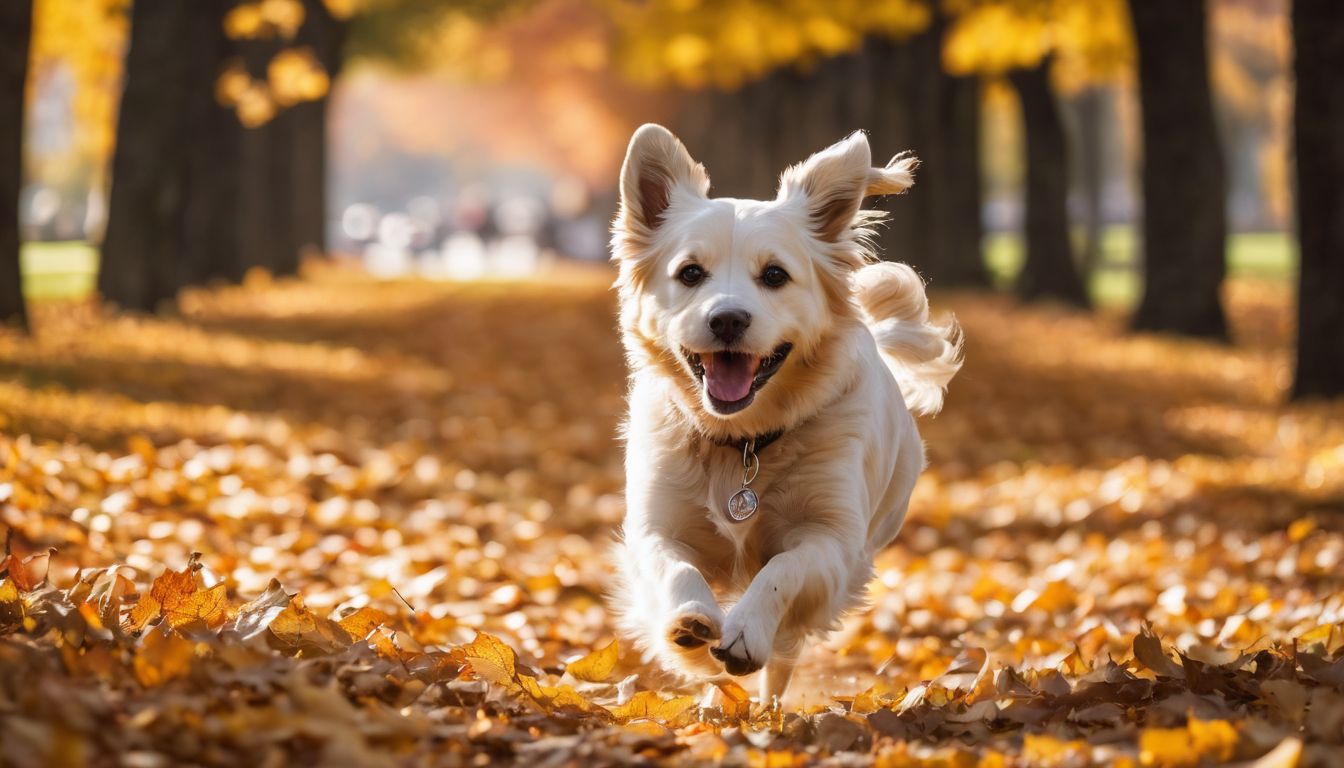Pets are a cherished part of many families, but their environmental paw-print is often overlooked. Did you know the global pet industry can significantly contribute to carbon emissions and deforestation? Our blog explores how responsible pet ownership can enhance sustainability in our communities while caring for our furry friends.
Dive in to discover a greener path for pet lovers!
Key Takeaways
- Choosing plant-based or insect-based pet foods reduces deforestation and carbon emissions as they require fewer resources than traditional meat-based products.
- Using biodegradable waste bags, composting pet waste, and supporting recycling programs help manage pet-related environmental impact effectively.
- Sustainable practices in pet ownership such as opting for eco – friendly toys, grooming products, and bedding supports both animal welfare and community sustainability.
- Educating pet owners about the ecological effects of their pets encourages responsible behavior that can lead to improved well-being of local ecosystems.
- Creating inclusive, pet – friendly spaces in communities promotes responsible ownership while fostering social interaction and environmental stewardship.
The Environmental Impact of Pets
Pets have a significant environmental impact, contributing to CO2 emissions from pet food production and waste management. Additionally, deforestation for pet food production further exacerbates the issue.
CO2 emissions from pet food production
Producing food for our furry friends has a significant carbon footprint. It involves processing large amounts of meat and plant products which, in turn, generates substantial CO2 emissions.
The energy needed to grow, harvest, and transport the ingredients before they even become pet food adds layers of environmental impact.
Animal-derived ingredients often dominate pet foods, specifically those high in protein content. Rearing livestock for these ingredients contributes to deforestation and greenhouse gas production.
To curb these emissions from escalating further, it’s crucial to consider more sustainable practices within the pet food industry. This means sourcing local ingredients where possible and exploring eco-friendly alternatives like plant-based or insect-based proteins that have a lower ecological impact.
Waste management
Sustainable waste management is essential for pet owners. Choosing biodegradable pet waste bags and compostable litter can help reduce environmental impact. Ensuring proper disposal of pet waste, such as using designated bins or flushing small amounts of cat litter down the toilet, can prevent it from entering waterways and causing pollution.
Additionally, supporting local initiatives that promote responsible disposal of pet waste through education and infrastructure development is crucial for creating sustainable communities.
Moving forward to “The Importance of Incorporating Animal Welfare in Sustainable Development Goals,” understanding the interconnectedness between animal welfare and sustainable development goals is vital for achieving eco-friendly communities.
Deforestation for pet food production
Pet food production contributes to deforestation as large areas of land are cleared to grow crops for animal feed. This results in the destruction of natural habitats and ecosystems, impacting biodiversity and contributing to climate change.
The demand for pet food ingredients such as soybeans, corn, and wheat drives agricultural expansion into forests, leading to loss of valuable carbon sinks and disrupting the delicate balance of our environment.
The environmental impact of deforestation for pet food production extends beyond carbon emissions; it also affects water resources and soil quality. Sustainable pet owners can consider alternatives that do not contribute to deforestation, such as plant-based or insect-based pet foods, reducing the strain on natural resources and promoting a more eco-friendly approach to pet ownership.
Promoting Sustainable Pet Ownership
Choose eco-friendly pet food alternatives, properly manage pet waste, and use sustainable pet supplies to reduce the environmental impact of pet ownership and promote sustainability in communities.
Choosing eco-friendly pet food alternatives
To reduce the environmental impact of pet ownership, consider the following eco-friendly pet food options:
- Opt for plant-based or insect-based protein sources instead of traditional meat-based pet foods.
- Look for products with sustainable packaging made from recyclable or biodegradable materials.
- Choose organic and locally – sourced ingredients to support sustainable farming methods and reduce carbon emissions from transportation.
- Explore homemade pet food recipes using whole, fresh ingredients to minimise processing and packaging waste.
- Consider alternative protein sources such as crickets, mealworms, or algae, which require fewer resources to produce compared to conventional animal proteins.
Properly managing pet waste
Transitioning from choosing eco-friendly pet food alternatives to properly managing pet waste is crucial for a sustainable pet ownership approach.
- Use biodegradable poop bags to dispose of your pet’s waste, reducing the environmental impact.
- Implement composting systems for pet waste in your backyard or community green spaces to minimise landfill contributions.
- Consider installing a pet waste digester to turn pet waste into a harmless, natural fertiliser for plants and gardens.
- Avoid flushing pet waste down the toilet as it can contaminate water sources; choose environmentally friendly disposal methods instead.
- Encourage the development of dedicated pet waste recycling programmes in local communities to manage and repurpose pet waste effectively.
Using sustainable pet supplies
- Choose eco – friendly pet toys made from recycled materials or natural fibres to minimise environmental impact while providing enrichment for your pets.
- Opt for biodegradable pet waste bags to reduce plastic pollution and promote proper waste management in your community.
- Use non – toxic and natural grooming products to minimise chemical exposure for both your pets and the environment.
- Consider purchasing pet accessories, such as collars and leashes, made from sustainable and ethically sourced materials to support eco-friendly pet industry practices.
- Select bedding and litter options that are biodegradable or made from renewable resources, reducing the carbon footprint of your pet’s everyday essentials.
The Importance of Incorporating Animal Welfare in Sustainable Development Goals
Ensuring the well-being of animals in sustainable development goals is essential for enhancing connections between wildlife and humans, as well as maintaining ecological balance in communities.
To learn more about the vital role of pets in sustainable communities, keep reading!
Enhancing connections between wildlife and humans
Enhancing connections between wildlife and humans fosters a deeper understanding of the natural world. Encouraging responsible pet ownership by educating individuals about the impact of pets on ecosystems is crucial for maintaining ecological balance.
Promoting animal welfare within sustainable development goals strengthens the bond between humans, pets, and wildlife, contributing to community development and global hunger initiatives.
Integrating animals into urban planning not only supports sustainable pet care but also facilitates animal-assisted therapy for sustainability.
Ecosystem effects
Pets can have a significant impact on local ecosystems. Domestic animals, when not properly managed, can disrupt the natural balance of wildlife and vegetation. Their presence can lead to soil erosion and damage to native plant species.
Additionally, pets may also contribute to the decline of small animal populations as they compete for resources in their habitats.
Furthermore, pet waste left in public areas poses a threat to water quality and can harm aquatic ecosystems. As responsible pet owners, it is crucial to be mindful of our pets’ interactions with local environments as well as take proactive measures to minimise their ecological footprint.
Ways to Coexist with Pets in Sustainable Communities
Educating pet owners on responsible pet ownership and promoting pet-friendly communities can help create a harmonious environment for pets and humans. Read more about the role of pets in sustainable communities to learn how you can make a positive impact on the environment.
Educating pet owners on responsible pet ownership
- Providing information on the environmental impact of pet-related activities, such as waste management and carbon footprint of pet ownership.
- Offering guidance on selecting sustainable pet supplies and eco-friendly pet products to reduce ecological impact.
- Organising workshops and seminars to promote awareness about sustainable pet ownership within communities.
- Collaborating with local authorities to implement policies that encourage responsible pet ownership and environmental stewardship.
- Establishing educational campaigns to raise awareness about the importance of integrating animal welfare into sustainable development goals.
Promoting pet-friendly communities
- Incorporate green spaces within residential areas that accommodate both pets and their owners, enhancing physical activity and social interaction while promoting a sense of environmental stewardship.
- Encourage local authorities to introduce ordinances or policies that support pet – friendly housing options, ensuring that sustainable living is accessible to pet owners.
- Collaborate with businesses and community organisations to create events and initiatives that celebrate responsible pet ownership, emphasising the importance of sustainability in pet care practices.
- Advocate for infrastructure development that promotes safe and eco-friendly transportation for pets, such as walking trails, designated pet exercise areas, and waste management stations.
Conclusion
Incorporating animal welfare into sustainable development goals enhances connections between wildlife and humans. Educating pet owners on responsible pet ownership is vital for coexisting with pets in sustainable communities.
Pet-friendly environments can be promoted to support the ecological impact of pets. Sustainable pet food options and eco-friendly pet products play a key role in encouraging sustainable pet ownership.
The role of pets in sustainable communities is essential for promoting environmental conservation and animal welfare.
FAQs
1. How do pets contribute to sustainable communities?
Pets play a vital role in sustainable communities by supporting ecological balance, participating in animal-assisted work and therapy, and encouraging eco-friendly pet products.
2. What is the importance of veterinary care for sustainability?
Proper veterinary care ensures that pets are healthy and well, which contributes to overall food security and reduces their ecological impact on sustainable communities.
3. Can pets be part of a sustainable lifestyle through their diet?
Yes, choosing sustainable pet food options helps minimise environmental effects while maintaining good health for our pets within the framework of a sustainable pet industry.
4. Are there environmentally friendly choices for pet owners?
Indeed! Owners can opt for eco-friendly pet products which supports reducing waste and conserves resources in line with creating more resilient and enduring communities.





